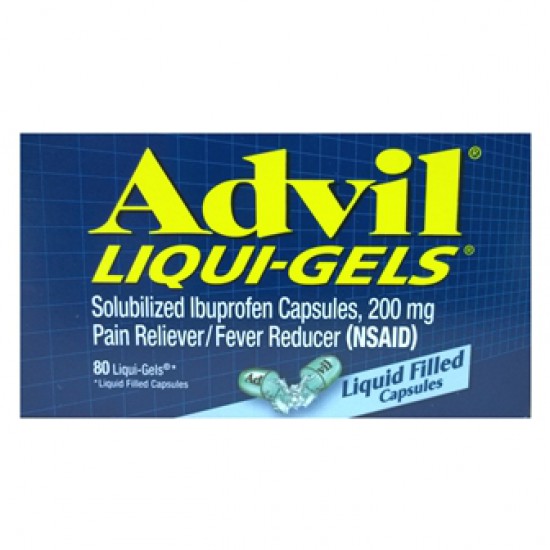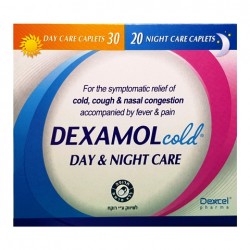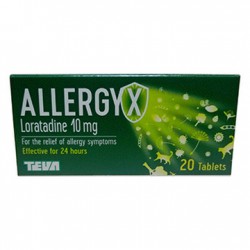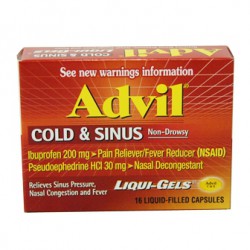Advil liqui-gels

Relieves headaches, headaches associated with migraines, toothaches, back pain, muscle and menstrual pain. Anti-inflammatory of rheumatic diseases and antipyretic.
Active Ingredients
Each capsule contains:
Ibuprofen 200 mg (present as the free acid and potassium salt).
Indications
Therapeutic group:
Non-Steroidal Anti-Inflammatory Drugs (NSAID).
Advil Liqui-Gel 200 are intended for the relief of pain associated with headache, toothache, backache, muscular and menstrual pains , for the treatment of migraine associated headache.
Advil Liqui-Gel 200 can be used as well as antipyretic and anti-inflammatory for rheumatic diseases.
Instructions
Do not divide, crush or chew the capsule. Swallow the capsule whole as it contains liquid.
Swallow the medicine with a glass of water.
This medicine may be taken with or after a meal. Take this medicine with food or milk in cases of stomach discomfort such as heartburn or stomach ache.
The recommended dose is usually:
Adults and children over 12 years of age:
1 capsule every 4-6 hours, as long as symptoms persist. If pain or fever does not respond to 1 capsule, 2 capsules may be used.
Do not exceed six capsules in a 24 hour period, unless directed by a physician.
Take the lowest dose that obtains the intended use.
Do not exceed the recommended dosage.
Do not take longer than 10 days, in adults, and 3 days in children (12-18 years), unless directed by a physician.
Stop the treatment and contact a physician: if fever is increasing or persisting for more than 3 days, if pain gets worse or persists for more than 10 days, if abdominal pain gets worse or becomes persistent, or if new symptoms appear.
You must contact the physician if the illness signs (symptoms) worsen or do not improve within 10 days in adults and within 3 days in adolescents (12 – 18 years).
The medicine is usually not intended for children and infants under the age of 12 years.
During prolonged treatment with this medicine, the following tests should be performed: blood, urine, liver and kidney function.
Warnings
Do not use Advil Liqui-Gel 200 if:
- You are sensitive (allergic) to the active ingredient or to any of the other ingredients that this medicine contains.
- You are in the last 3 months of pregnancy.
- You are suffering from problems or severe side effects, or if you experienced in the past an allergic reaction after taking antipyretic and analgesic medicines such as aspirin or other medicines of the NSAID class. An allergic reaction may be manifested by difficulties in breathing, asthma, runny nose, rash and skin swelling.
- You have or had a history of gastrointestinal ulcer or gastrointestinal bleeding.
- You have a history of gastrointestinal bleeding or gastrointestinal perforation as a result of using this medicine or any other NSAIDs.
- You concomitantly use other medicines from the non-steroidal anti-inflammatory drugs group.
- You know that you are sensitive to aspirin or salicylates or to non-steroidal anti-inflammatory drugs group (NSAID).
- You are suffering from bleeding in the cerebral blood vessels, other active bleeding or hematological diseases.
- You are suffering from liver failure, kidney failure or heart failure.
Treatment with Advil Liqui-Gel 200 may cause stomach bleeding, especially if you:
- Are older than 60 years of age.
- Have had gastric ulcers or bleeding problems.
- Are taking other medicines of the non-steroidal anti-inflammatory drugs class (aspirin, ibuprofen, naproxen or others).
- Are taking blood diluting medicine (anti-coagulant) or steroid medicine.
- Consume more than 3 alcoholic drinks per day.
Treatment with this medicine at a dosage above the recommended dosage or for prolonged period of time may increase the risk of cerebral stroke or heart attack and stomach bleeding.
Ibuprofen may cause a severe allergic reaction, especially in people sensitive to aspirin, such as: rash, skin redness, skin rash accompanied by itching, skin blisters, facial swelling, asthma (wheezing), shock. If an allergic reaction develops, immediately stop the treatment and contact a physician.
Stop the treatment and contact a physician if you notice bloody vomit or bloody or black stool.
If you are about to undergo surgery, including dental surgery, or laboratory tests while taking this medicine, inform the surgeon.
This medicine may cause a special sensitivity upon exposure to sun; therefore avoid exposure to sun and ensure appropriate protection (long sleeved clothes, a hat, sunscreens etc.).
Taking this medicine may cause temporary infertility in women, which is reversible upon treatment discontinuation. It is not probable that Ibuprofen used occasionally will affect your chances of becoming pregnant, but you should consult with your physician before taking this medicine if you encounter a problem in becoming pregnant.
There is a concern of renal impairment in adolescents (12-18 years) due to the use of this medicine. Consult a physician prior to using it in adolescents who did not drink a sufficient amount of fluids or who lost fluids due to excessive vomiting or excessive diarrhea.
Prior to beginning treatment with Advil Liqui-Gel 200, tell the physician if:
- You are breastfeeding
- You are in the first 6 months of pregnancy
- You are suffering or had previously suffered from dysfunction of the respiratory system (such as asthma, nasal polyps)
- You are suffering or had previously suffered from liver function disorder
- You are suffering or had previously suffered from problems with blood coagulation
- You are suffering or had previously suffered from hypertension
- You are suffering or had previously suffered from heart and kidney diseases
- You are suffering or had previously suffered from problems of the gastrointestinal system such as: heartburn, irritable stomach, abdominal pain, peptic ulcer or inflammatory bowel diseases since this medicine may exacerbate these conditions.
- You are suffering or had previously suffered from liver disease
- You are suffering or had previously suffered from lupus erythematosus - an autoimmune disease affecting connective tissue of the joints and internal organs or hay fever
- You are suffering or had previously suffered from cerebral stroke or you are at risk of having a stroke (you suffer from hypertension, diabetes, high cholesterol blood level or if you are a smoker)
- You are taking diuretics
- You are older than 60 years of age
- You have previously taken a medicine of this class or another antipyretic medicine which resulted in severe side effects
- You are under medical observation due to a severe medical condition
- You are trying to become pregnant
- You are a smoker
If you are taking or have recently taken any other medicines , including non-prescription drugs and nutrition supplements , please tell your doctor or pharmacist , in order to prevent hazards or lack of efficacy arising from drug interactions. Especially inform your doctor or pharmacist if you are taking:
- Aspirin, salicylates and other non-steroidal anti-inflammatory drugs
- Steroids
- Anticoagulants such as: Warfarin or Ticlopidine, platelet aggregation inhibitors medications
- Anti-hypertensive medicines (ACE inhibitors such as Captopril, beta blockers such as Atenolol or angiotensin II receptor antagonists such as Losartan)
- Antidepressants of the SSRI class, (for treatment of mental problems such as depression) due to the increased risk of gastrointestinal bleeding
- Other ibuprofen containing agents
- Lithium
- Methotrexate
- Cyclosporine
- Tacrolimus
- Probenecid
- Mifepristone
- Quinolone antibiotics (such as Ciprofloxacin)
- Corticosteroids
- Cardiac glycosides (Digitalis, Digoxin)
- Zidovudine (anti-viral preparation, against -HIV)
- Phenytoin, for the treatment of epilepsy
- Antacids
If you are taking aspirin due to a heart attack or a stroke, ibuprofen may reduce the efficacy of aspirin.
Do not use this medicine if you are taking aspirin at a daily dose exceeding 75 mg or other non-steroidal anti-inflammatory drugs.
Do not drink wine or any other alcoholic beverages on a regular base while using the medicine.
Consult a physician prior to using the medicine if you are in the first 6 months of pregnancy.
Do not use the medicine in the last 3 months of pregnancy.
Ibuprofen is excreted in breast milk in very low concentrations; however it is unlikely that the medicine will affect your baby.
If you are breastfeeding, pregnant, think that you are pregnant or planning to get pregnant, consult a physician or a pharmacist prior to using the medicine.
In certain people, this medicine may cause drowsiness, dizziness or blurred vision. If you experience these symptoms after using the medicine, you must exert caution when driving a car or operating dangerous machinery.
Please do not consider this information as an alternative to consulting your physician or pharmacist.
For further information on instructions for use, risks and side effects, please read the patient package insert and consult your doctor or pharmacist.
Read the patient package insert carefully before starting to take any medication.
































